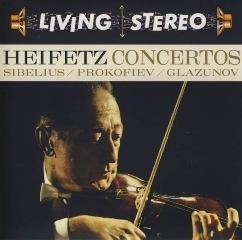Sibelius Prokofiev Glazunov – Violin Concertos (2010)
Sibelius Prokofiev Glazunov – Violin Concertos (2010)

Violin Concerto In D Minor, Op. 47 (26:43) 1 Allegro Moderato 13:37 2 Adagio Di Molto 6:18 3 Allegro Ma Non Tanto 6:48 Violin Concerto No. 2 In G Minor, Op. 63 (23:12) 4 Allegro Moderato 9:02 5 Andante Assai 7:59 6 Allegro Ben Marcato 6:11 Violin Concerto In A Minor, Op. 82 (18:56) 7 Moderato 3:59 8 Andante Sostenuto 3:24 9 Tempo I 6:04 10 Allegro 5:29 Jascha Heifetz – violin Chicago Symphony Orchestra (1-3) Boston Symphony Orchestra (4-6) RCA Victor Symphony Orchestra (7-10) Walter Hendl – conductor (1-3, 7-10) Charles Munch – conductor (4-6)
This Heifetz recording of this Prokofiev concerto is one of the finest performances and recordings of anything ever done, and in this splendid new digital reincarnation critical sonic details come through with added clarity, e.g., the pp bass drum notes. Heifetz and Munch attain the Haydnesque almost robot-like andante assai accompaniment in the slow movement contrasting vividly with the melting sweetness of the violin line. Most importantly, in all of these re-mastered Heifetz recordings the violin tone is greatly enriched to the benefit of Heifetz’s reputation. Surprisingly, for an artist who recorded as much as he did, microphones were not kind to Heifetz’s tone. On many commercially released recordings, Heifetz sounds astringent, gritty, sour, even false; but here we hear what he really sounded like and the real beauty and complexity of his tone is made clear on recording at last for those of us who could never hear him play live up close.
Rozhdestvensky and Perlman do a beautiful job with this work also, warmer, sweeter, more rhapsodic, a smoother surface throughout. Timings on the first and second movement are 12% longer. Some will like the performance better although the recording quality, while excellent for CD, cannot compare with the SACD.
In the Sibelius Concerto Heifetz is competing with himself; his 1935 recording with Beecham remains a monument, a standard not yet surpassed; however, that primitive recording distorts the overall orchestral sound as well as leaving many details inaudible. Real connoisseurs will need both recordings to truly appreciate Heifetz’ accomplishment. Wisely not attempting to better Heifetz, other violinists move in other directions. Mutter and Previn give us hair-tearing, tear-jerking, foot-stomping gypsy passion. Eidus goes them even one further; his first two movements are gut-wrenching, heart-rending, but he actually can’t manage the rapid leaps and double-stops in the finale. Kavakos gives us the "original" 1903 version, as much like the familiar 1905 version as Mussorgsky’s original Boris is like the Rimsky-Korsakov version. When you think you’ve heard everything in this concerto, then listen to the earlier version, hear Sibelius’ creative mind in action, and thus deepen your understanding of the artistic decisions he eventually made in comparison with his original inspirations. Kraggerud and Engeset give a very capable, very individual reading on a surround sound DVD-Audio. Another worthy version I have enjoyed is by Tossy Spivakovsky and Tauno Hannikainen on Everest, and classic account by Julian Sitkovetsky (father of Dimitri) also deserves mention.
In the notes to the Perlman recording, the annotator says that the Violin Concerto is "... generally regarded as Glazunov’s most brilliant and effective composition." That may have been a true statement in 1989, however no one who has heard a good recording of the Fifth Symphony (Polyansky, or Fedoseyev) or the First Symphony (Järvi) could possibly agree with it. It is interesting that some passages clearly inspired Prokofiev in his Second Violin Concerto. Although sensationally popular in Russia, Glazunov is only now becoming known in the West. The Violin Concerto has been familiar for a long time, but we have many treasures yet to discover, and when that has occurred, the Violin Concerto will probably move down a few notches in the list.
In the Glazunov Concerto the "RCA Victor Symphony Orchestra" would likely be either the 20th Century Fox or MGM Studio orchestra, or maybe members of both, first-rate musician friends of Heifetz’s, come just down the street from the studios to the hall. In spite of the exceptional recording quality, Heifetz’ emotionality here leaves me relatively unaffected; it seems artificial, calculated; but, be that as it may, Heifetz’ performance of the cadenza is a stunning musical achievement you won’t want to miss hearing. Perlman gives us authentic emotion and drama. Fischer, on a Pentatone surround sound SACD, gives us a clear, straightforward but sensitive reading without sentimentality and makes the dramatic structure of the work more evident. Overall, I prefer both Perlman and Fischer to Heifetz in this concerto.
However, the recording of the accompaniments in all cases is clearly superior on the RCA to the others, even to the newer surround sound recordings. You will hear new details in the orchestral parts. With these rich detailed recordings it is easy enough to generate convincing rear channel information from a quality surround sound processor. --- Paul Shoemaker, musicweb-international.com
download: uploaded yandex anonfiles 4shared solidfiles mediafire mega filecloudio nornar
